|
|
|
Sort Order |
|
|
|
Items / Page
|
|
|
|
|
|
|
| Srl | Item |
| 1 |
ID:
118394
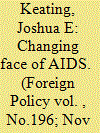

|
|
|
| 2 |
ID:
117786
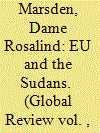

|
|
|
| 3 |
ID:
153910
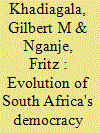

|
|
|
|
|
| Summary/Abstract |
South Africa is an emerging power with fairly strong democratic institutions that were crafted during the transition from minority to majority rule twenty years ago. How has South Africa used its position and power to promote democracy in Africa? Against the backdrop of debates on democracy promotion by emerging powers, this article probes attempts by successive post-apartheid governments to promote democracy in Africa. We argue that although democracy promotion featured prominently in South Africa's policy towards Africa in the immediate post-apartheid period under Nelson Mandela, the administrations of Thabo Mbeki and Jacob Zuma faltered in advancing democratic norms. This is largely because South Africa has confronted pressures to maximize pragmatic national interests, which have compromised a democratic ethos in a continental environment where these values have yet to find steady footing.
|
|
|
|
|
|
|
|
|
|
|
|
|
|
|
|
| 4 |
ID:
154509
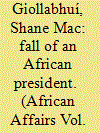

|
|
|
|
|
| Summary/Abstract |
The entry of the ANC into the arena of democratic politics provoked a dilemma for the party leadership that is familiar to political parties in a new democracy: how, if at all, should the party reform its internal organization to compete in a new electoral environment? This article draws on interviews with senior members of the ANC to develop a theory that describes how the ‘modernization’ of the ANC under President Thabo Mbeki led to his electoral defeat at the party's national conference in 2007. It contends that the process of modernization reduced systematically the role of the party's activist base in the policy-making process, creating a motive to replace the President, but left intact the role of activists in the selection of the party's leadership, which in turn provided an opportunity to replace the President at the party's national conference. The President's opponents exploited ruthlessly this opportunity by enlarging and mobilizing the party membership, using a clientelistic appeal for support, to deliver a resounding victory for their champion, Jacob Zuma. This type of clientelistic competition, which has become routine inside the ANC, undermined the democratic legitimacy of the party and its capacity to govern in the public interest.
|
|
|
|
|
|
|
|
|
|
|
|
|
|
|
|
| 5 |
ID:
095598


|
|
|
|
|
| Publication |
2010.
|
| Summary/Abstract |
In the years since the end of apartheid, South Africa has emerged from its status as an international pariah to a full fledged member of the international community. Riding a wave of new found legitimacy bolstered by a heroic myth surrounding President Mandela, South Africa began to rethink its role in the world. Perhaps more than Mandela, however, former President Thabo Mbeki laid claim to the title of Africa's spokesman to the world. Mbeki, through his African Renaissance, cast himself as the embodiment of the modern, postcolonial African blending African tradition and symbolism with the rhetoric of free markets and good governance. What this paper argues is that Mbeki's Renaissance highlights both what constitutes legitimate policies and behavior and the role of legitimacy and legitimation itself in international relations.
|
|
|
|
|
|
|
|
|
|
|
|
|
|
|
|
| 6 |
ID:
089143
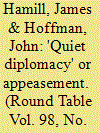

|
|
|
|
|
| Publication |
2009.
|
| Summary/Abstract |
This article offers a critical examination of South Africa's policy of 'quiet diplomacy' towards Zimbabwe since 2000, with the reasons behind it, especially the role of Thabo Mbeki, and considers possible alternatives. It argues that liberal values in Africa are usually prioritised at the abstract level in charters and declarations such as those of the African Union (AU), the Southern African Development Community (SADC), and the New Partnership for Africa's Development (NEPAD). The translation of such values into political practice has, however, become highly problematic, and they have frequently been eclipsed by other, more pressing, imperatives impinging upon the policy-making process. South African policy towards Zimbabwe since 2000, contend the authors, captures this paradox in stark relief.
|
|
|
|
|
|
|
|
|
|
|
|
|
|
|
|
| 7 |
ID:
113325


|
|
|
|
|
| Publication |
2012.
|
| Summary/Abstract |
South Africa's military has, since the First World War, been an oft-used and effective tool in the conduct of South African foreign policy, but this role has not always translated into power for Defence Department principals in its formulation. South African Defence Ministers for most of the country's history have played a minor role in the making of foreign policy; despite a change in this dynamic between approximately 1975-1990, the post-apartheid era has once again seen a diminishment of Defence's power in this arena. This article examines why Defence Ministers have generally been such weak players, with an eye toward disaggregating whether this was a product of interpersonal relationships with Cabinet and - most importantly - the Head of State, or whether this influence (or lack thereof) was more a function of South Africa's international standing. While determining who has influence on this process is difficult given the primacy of the national leader in making foreign policy and a lack of insider accounts by participants in the process, this article relies upon several interviews with participants and knowledgeable observers that help illuminate the process and Defence's role in it.
|
|
|
|
|
|
|
|
|
|
|
|
|
|
|
|
| 8 |
ID:
119441
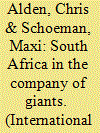

|
|
|
|
|
| Publication |
2013.
|
| Summary/Abstract |
South Africa, the continental economic giant and self-appointed spokesman for African development, is finding its distinctive national voice.
Emboldened by the invitation to join the BRICS grouping, its membership of the G20 and a second term on the UN Security Council, Pretoria is beginning to capitalize on the decade of continental and global activism undertaken by Thabo Mbeki to assume a position of leadership. Gone is the defensive posturing which characterized much of the ANC's post-apartheid foreign policy, replaced by an unashamed claim to African leadership.
The result is that South Africa is exercising a stronger hand in continental affairs, ranging from a significant contribution to state-building in the Democratic Republic of the Congo and South Sudan, to an unprecedented assertiveness on Zimbabwe.
But this new assertiveness remains constrained by three factors: the unresolved issue of identity, a host of domestic constraints linked to material capabilities and internal politics, and the divisive continental reaction to South African leadership. These factors continue to inhibit the country's ability to translate its international ambitions and global recognition into a concrete set of foreign policy achievements.
|
|
|
|
|
|
|
|
|
|
|
|
|
|
|
|
| 9 |
ID:
110982


|
|
|
|
|
| Publication |
2012.
|
| Summary/Abstract |
Sudan and South Sudan signed a non-aggression treaty in the Ethiopian capital Addis Ababa on 10 February, which African Union (AU) mediators hope will calm growing tensions between the two countries. Thabo Mbeki, the former president of South Africa and chief African Union mediator, told reporters both sides had agreed to respect the sovereignty and territorial integrity of the other. He was speaking after the first meeting between Sudan and South Sudan in a new round of talks aimed at addressing the numerous post-secession issues that have thus far eluded agreement, contributing to increasingly belligerent rhetoric from both sides. Underpinning the treaty, a new monitoring mechanism was created to investigate any allegations of violations by either side. However, it is unclear how this will be implemented in the remote border areas where most confrontations to date have occurred.
|
|
|
|
|
|
|
|
|
|
|
|
|
|
|
|
| 10 |
ID:
095466
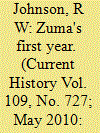

|
|
|
|
|
| Publication |
2010.
|
| Summary/Abstract |
So factionalized and divided is the ANC that it is not clear that either the party or the country is still governable.
|
|
|
|
|
|
|
|
|
|
|
|
|
|
|
|
|
|
|
|
|